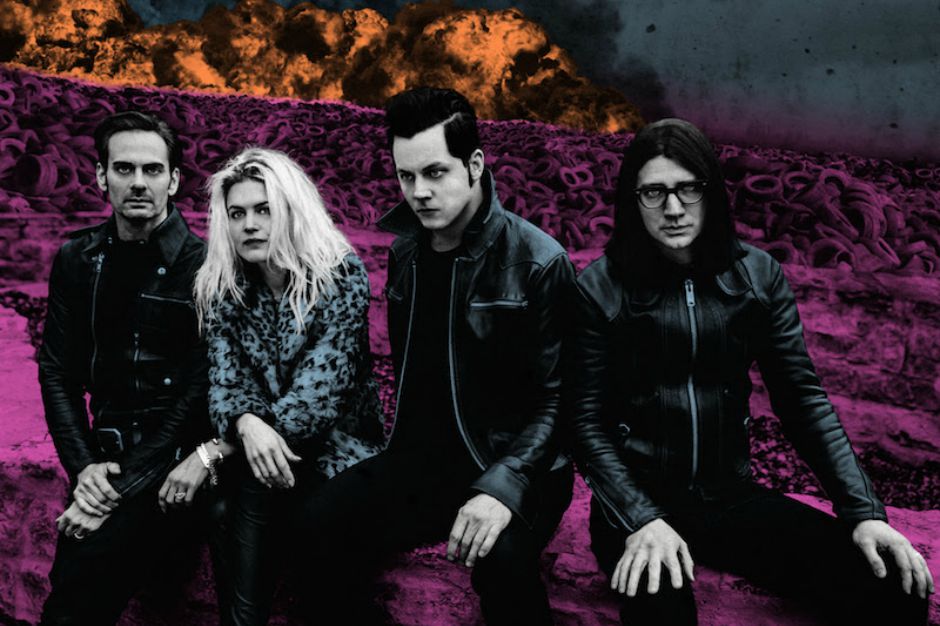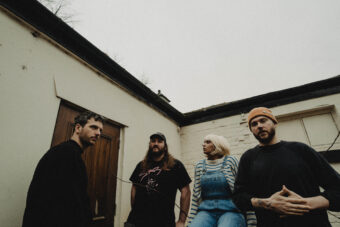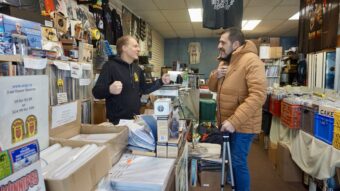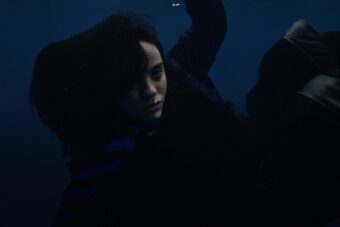The Dead Weather‘s Alison Mosshart, Dean Fertita, and Jack Lawrence make for a soft-spoken group — at first. Citing a late night out with friends at New York’s Black & White Bar, the blues-punk outfit is in desperate need of coffee as they sit down to talk about their first new record in half a decade: Dodge and Burn, the successor to Horehound (2009) and Sea of Cowards (2010), out on September 25 via Third Man Records, the label founded and operated by the band’s fourth member, Jack White.
Settling in on a faded sofa at Manhattan’s dim Bowery Hotel, Mosshart, who also serves as one half of grit-rock duo the Kills, visibly perks up once she’s handed a bowl of nuts for snacking and an extra-large cup of cold brew, which she gratefully sucks down.
As the three perch elbow-to-elbow, Lawrence, who plays in three additional companies (alt-pop collective the Raconteurs, garage-rock crew the Greenhornes, and Americana-folk project City and Colour), and guitarist/Queens of the Stone Age keyboardist Fertita are noticeably minus a former White Stripe. But no matter: Rock’n’roll’s famously wan Willy Wonka will roll in about two hours later at the Dead Weather’s official Dodge and Burn listening party.
Before the band adjourns to Alphabet City to unveil their latest, which took two years to complete and will feature remastered versions of previously released songs (“Buzzkill(er),” “Rough Detective”), along with new material such as the recently released single “I Feel Love (Every Million Miles),” the trio took a moment to walk SPIN through recording their third record together in Nashville and explain what’s preventing them from touring it.
It’s been five years since Sea of Cowards. What’s the reaction to your return been like?
Alison Mosshart: I don’t feel like there’s been much of a reaction. Not that many people have heard [Dodge and Burn]. I love it. That’s my reaction when I listen to it in the car. [Laughs.]
Your first record, Horehound, came together so quickly — over the course of three weeks. And Sea of Cowards came less than a year after. Does the fact that your third record was recorded over the course of two years change anything about the way it will sound?
Dean Fertita: We kind of viewed it as how they used to [record albums], where it was a collection of singles. So we did that for four songs, and we did the other eight over the course of a week and a half. So it was spread out, but the total time we spent on the record was three weeks to a month.
Was it tricky to find the time to record between juggling all four of your schedules with the Kills, Queens of the Stone Age, and the Greenhornes/City and Colour?
Mosshart: Life always gets in the way. That’s the thing. Everybody does have so much going on, so whenever we find a moment that we can grab, we do it. It’s usually just one or two days in the studio, and then we might not get to reconvene for a month again until everyone’s going to be in town.
Fertita: Yeah, the cool thing about this record for me is we went into it knowing that we weren’t going to do a normal promotional cycle for a record — touring it, the normal thing that people do when they release records. It was more of us just wanting to get together and play again because we hadn’t done it in four years. It was more about us staying close and continuing to make music.
Is it strange, not touring?
Jack Lawrence: Yeah, ’cause that’s pretty normal thing to do, I think for all of us.
Mosshart: We’re doing something pretty non-traditional by doing this, but when you start to think about it, you think, “What’s better? What’s worse? Not touring or just sitting on a record for a couple of years?” It feels great to put something out in the world and choosing to look at that in a positive way, even though we all wish we could be on stage.
What do you make of how famous Third Man Records has become in the time since the Dead Weather first recorded there in 2009?
Fertita: That studio for me is always going to represent this band. The first thing we recorded there, that’s kind of how this band started. The fact that it’s close to all of us — it’s kind of a refuge for us to make music and be together. The fact that [Jack White’s] done so many records and sessions since we’ve started — it’s incredible. It’s cool to be part of the initiation of what that is becoming and what it has become.
Lawrence: If you go into the office in Third Man, there’s a photo on the wall of Alison on the concrete floor before the place was built up. We did kind of break it in.
Who made the first move to put Dodge and Burn together?
Lawrence: Dean’s always been kinda crackin’ the whip a bit.
Fertita: [Laughs.] We’ve always done this annual vacation together at the end of every year. We always talk about [getting back together], so I think the last vacation, we just sort of said, we’re all going to be home when we get back, so let’s just do it.
Where did the title Dodge and Burn come from?
Mosshart: It’s a photography term.
Fertita: Our photographer friend David Swanson said it.
Mosshart: It’s something you do in a dark room when you’re printing a picture and you dodge parts that you don’t want to have as much light on them, and then you burn parts that need more light. So you’re like, moving a piece of paper around and bring out different parts of the photograph. They have those tools in Photoshop, too. I think Swanson said it out loud, and the greatest thing was, nobody knew what that was. It’s kind of a lost term, and it’s really cool sounding. It could mean a hundred things. It’s pretty tough sounding. I drive a Dodge. [Laughs.]
In the earliest days of the Dead Weather, Alison, you did most of the singing. But slowly, over time, I’ve heard more of Jack White’s vocals come in on Sea of Cowards and songs like “Three Dollar Hat” and “Rough Detective” on Dodge. Who decides who will sing what?
Mosshart: Well, it’s kind of like, who gets there first. Who writes the lyrics is the person who’s going to sing, generally. Usually Jack’s playing drums, and I’m sitting there with a notebook and a mic, so usually it’s me. Then he’ll have ideas for a song that he wants to do. There’s not really any one method. It’s just kind of like who’s quicker on the draw.
From where I sit, we all walk in the room, everybody gets their instruments, and everybody just starts playing. And 45 minutes later, a song is written and it’s pretty much recorded. It’s just insanely fast, and there’s not too much talking about how something is going to go or what we’re trying to do. We play it until it’s great.
What’s the story behind an aggressive, don’t-f–k-with-me song like “Buzzkill(er)”?
Mosshart: It’s about somebody who’s killing your buzz. Doesn’t that happen every day?
What kills your buzz?
Lawrence: Pulling weeds.
Fertita: [To Lawrence:] You’re just saying that because you just went through weed hell.
Lawrence: You know that band the Grass Roots? It’s kind of a made-up band, because it’s just a bunch of studio guys. But the Grass Roots… I understood it for a second. Grass roots. They’re the hardest roots to pull. They just keep coming back.
Mosshart: Airport security is a vibe killer. I have to face those guys almost every day. [Laughs.]
So when you’re writing for the Dead Weather, Alison, how many of your lyrics wind up being freestyle?
Mosshart: I mean, you can tell by reading [the lyrics] that some of them make sense and some of them are stream of consciousness. I really enjoy that style of writing. I don’t get to do that too much in the Kills. So to be allowed to jam with my mind — it’s kind of awesome. I tend to like to trust the first thing that I say. The music really inspires it. I can feel like I’m sort of channeling a character in a story. I don’t think it’s the greatest lyricism of all time…
Fertita: Well, I disagree.
Lawrence: I do too.
Fertita: I wouldn’t say that you’re underrated, I just think that more people should know what a great lyricist she is.
Mosshart: You guys are very sweet.
Lawrence: “Like bubblegum in your hair.”
Mosshart: “It isn’t fair, but it smells good.”
I’m a fan of the song title “Rough Detective.”
Mosshart: Yeah, that’s a crazy one. That one I said it sounds like demented kids’ music. I love it so much, it’s so weird. I keep asking, “What is that song?” It’s totally nuts.
Fertita: If we had a TV show, it would be the theme.
What would a Dead Weather TV show be about?
Fertita: Solving mysteries and blowing stuff up.





